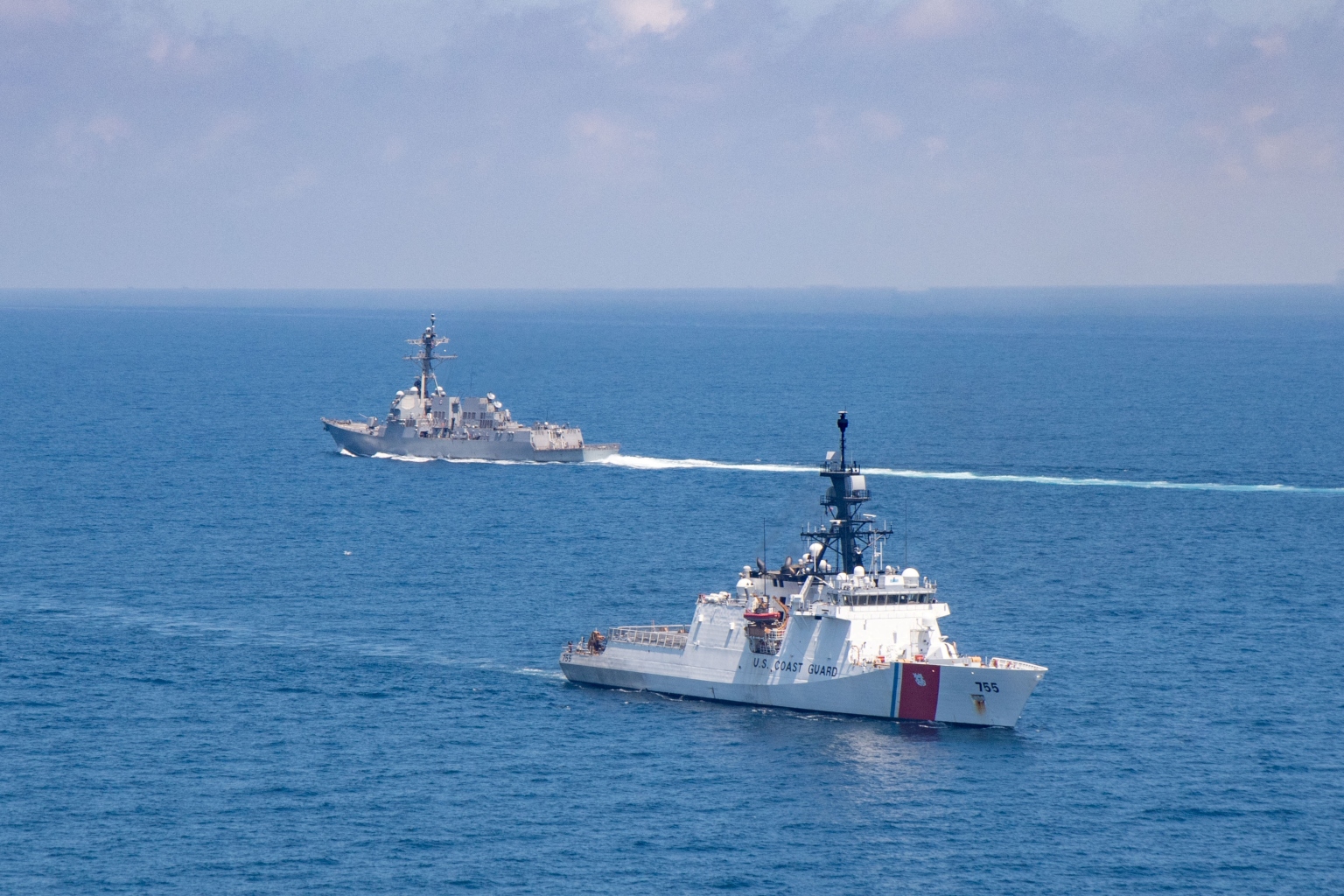US rejects China's claims over Taiwan Strait as concerns grow
Sign up now: Get ST's newsletters delivered to your inbox

In a photo taken on Aug 27, 2021, the Arleigh Burke-class guided-missile destroyer USS Kidd and US Coast Guard cutter Munro are seen conducting Taiwan Strait transits.
PHOTO: REUTERS
Follow topic:
WASHINGTON (BLOOMBERG) - Biden administration officials have decided to reject a vague new assertion by China that the Taiwan Strait is not "international waters" and are increasingly concerned the stance could result in more frequent challenges at sea for the island, according to people familiar with the matter.
Chinese officials have made such remarks repeatedly in meetings with US counterparts in recent months, Bloomberg reported last week.
That raises the prospect that China could be preparing a new challenge to US regional influence and military power in a key area of discord between the two countries.
China has long asserted that the Taiwan Strait is part of its exclusive economic zone, and takes the view there are limits to the activities of foreign military vessels in those waters.
While China regularly protests US military moves in the Taiwan Strait, the legal status of the waters previously wasn't a regular talking point in meetings with American officials.
The timing of the assertion is causing alarm within the administration, given that the global security environment is already fraught in the wake of Russia's invasion of Ukraine.
In February, China and Russia suggested in a joint statement that they might support each other's territorial claims in a way that one official said resembled a bid to carve out spheres of influence.
US President Joe Biden has been briefed on the matter and his national security team is examining the Chinese claim to understand exactly what it entails, the people said.
The team is looking at the language China has used to describe the strait in previous decades and is working with US allies to assess their interpretations of the language.
US officials are increasingly concerned that the claim may be a deliberate effort to muddy the legal interpretation of the sea around Taiwan in ways that could suggest that China regards it as an internal waterway, officials said.
The administration has already conveyed its position to Beijing. It's unclear what China means by "international waters," but the language may be intended to deter the US from sailing through the strait, a practice that Beijing has criticised as harming stability and sending the wrong signal to "Taiwan independence forces."
The people said it also wasn't clear yet whether China would take practical steps to enforce its position. Some previous Chinese claims, such as its proclamation of an air defence identification zone in 2013, have been only sporadically enforced.
While China's military has regularly probed Taiwan's defences with flights into the island's own air defence identification zone in recent years, its maritime challenges have been more limited.
The White House and the Chinese embassy in Washington didn't immediately reply to requests for comment.
The US is unlikely to be stopped by the more assertive language from China, whose claims over Taiwan have taken on a new focus after Russia invaded Ukraine in February.
Some US officials believe that China is gauging the response in Washington to the Ukraine crisis as a proxy for how the US would deal with more aggressive action by Beijing against Taiwan.
US warships transit the Taiwan Strait several times a year while en route between the East and South China Seas, averaging about one trip a month since 2020. The US Navy has conducted at least five transits this year, according to data compiled by Bloomberg, and will probably continue to do so, seeing if Beijing will back its words with actions.
"The Taiwan Strait is an international waterway" where freedom of navigation and overflight "are guaranteed under international law," State Department spokesman Ned Price said in an email. "The United States will continue to fly, sail and operate wherever international law allows, and that includes transiting through the Taiwan Strait."
Under the United Nations Convention on the Law of the Sea, which China has ratified but the US has not, nations are entitled to territorial waters stretching 12 nautical miles from their coast. They may also claim an exclusive economic zone stretching another 200 nautical miles. Beyond that are the high seas.
At its widest, the Taiwan Strait spans some 220 nautical miles. Even if China were to use the same legal terms as other countries, it doesn't interpret the associated rights in the same way as the US and its allies.
China seeks to restrict what militaries can do in the area claimed as its exclusive economic zone, while the US and its allies have a much freer interpretation.
Foreign Ministry spokesman Wang Wenbin said at a news briefing in Beijing last week that China claims "sovereignty" over the Taiwan Strait.
"There is no such thing as international waters in international maritime law," Mr Wang said. "Relevant countries claim that the Taiwan Strait is in international waters with the aim to manipulate the Taiwan question and threaten China's sovereignty."
US-China relations are likely in the worst state since former President Richard Nixon's historic trip in 1972 helped re-establish diplomatic ties between Washington and Beijing, Mr Nicholas Burns, the US ambassador to China, said this month.
US National Security Adviser Jake Sullivan and China's top diplomat, Mr Yang Jiechi, met Monday (June 13) in Luxembourg for more than four hours, in a sign that leaders are trying to keep high-level communications between the two sides open even as tensions increase.
Mr Biden told reporters on Saturday he'll be talking to his Chinese counterpart Xi Jinping "soon," without specifying a date.

